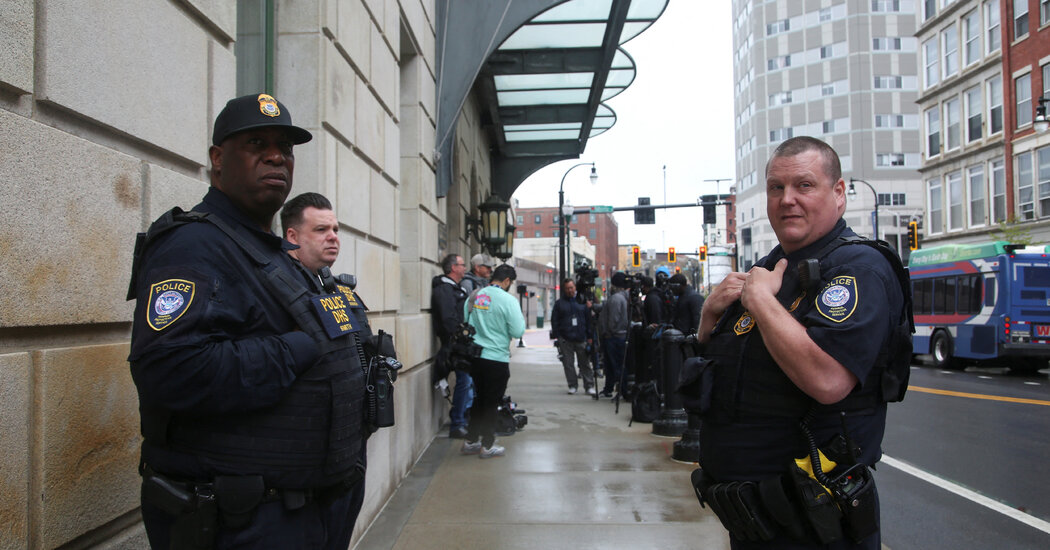WORCESTER, Mass. — Jack Teixeira, the Massachusetts Air National Guardsman accused of posting classified documents online, will remain in custody whil
WORCESTER, Mass. — Jack Teixeira, the Massachusetts Air National Guardsman accused of posting classified documents online, will remain in custody while a judge considers new evidence that raised serious questions about the military’s decision to grant him a high-level security clearance.
During a tense 90-minute hearing on Thursday, lawyers for the Justice Department asked a federal magistrate judge in Massachusetts to detain Airman Teixeira indefinitely pending his trial, arguing that his history of violent and racist remarks, coupled with his attempts to obstruct its investigation, made him a “serious flight risk.”
The magistrate judge, David. H. Hennessy, did not immediately rule on the matter, saying he needed more time to consider that motion and a request by the airman’s court-appointed lawyers that he be immediately released to his parents’ custody on $20,000 bond.
Airman Teixeira’s lawyers said he never intended to disseminate any information to the news media or the nation’s adversaries, but only to a small group of friends in a chat room on the gaming platform Discord.
One lawyer, Brendan Kelley, suggested Airman Teixeira, 21, could have fled after news of the leak emerged in the news media. Instead, he “sat on his mother’s porch reading the Bible” waiting for federal agents to arrest him, he said.
But Judge Hennessy seemed skeptical, describing the government’s concerns about national security as legitimate. He questioned whether someone so young, and steeped in technology, could be naïve enough to believe that the classified documents he posted online would be confined to a small group.
“Your argument is that he had no idea it would go somewhere beyond this little circle of people?” Judge Hennessy asked. “I have to tell you, I find it a little incredible that the defendant did not foresee that possibility.”
As he entered the courtroom, Airman Teixeira offered a fleeting half-smile before defaulting to a sterner expression. His mother, by contrast, sobbed at the sight of her son shuffling into the room in an orange prison uniform, his legs shackled.
Outside, the reverberations of the leak are still being felt.
Two of Airman Teixeira’s superiors at the 102nd Intelligence Wing on Cape Cod have been suspended pending completion of an internal investigation by the Air Force inspector general, according to a spokeswoman for the Air Force, Ann Stefanek. Their access to classified information has been temporarily blocked, she added.
Officials said the decision to grant Airman Teixeira top secret security clearance was, in hindsight, clearly a grave misjudgment. But people who weigh clearances must often determine whether a blemish on an applicant’s record is a harbinger of trouble or just a youthful error, they said.
Officials privately acknowledge that the security clearance process is outdated, leaning too heavily on traditional investigative techniques, like speaking with neighbors, and too little on parsing a person’s activities online.
The government’s filing included several disturbing details about the airman’s past behavior. Justice Department lawyers highlighted his violent comments in chat groups and his suspension from high school after discussing Molotov cocktails and other weapons — factors that could have influenced the decision to grant him clearance as an information technology specialist.
Airman Teixeira did not hide the incident, a military official said, and reported his suspension to the Air Force.
After the magistrate judge rules on Airman Teixeira’s detention status, the next major step is likely to be the filing of a grand jury indictment, which would include a much more detailed narrative of the allegations against Airman Teixeira, including a more specific accounting of the charges he will face.
In its 18-page filing late Wednesday, the government suggested he could face a prison sentence of 25 years or more if convicted.
Worcester, a city 50 miles west of Boston, is where Judge Hennessy’s courtroom is based. But the case will eventually be assigned to a federal judge in Boston, assuming it is not moved out of Massachusetts entirely, which remains a possibility, according to people with knowledge of the situation.
Officials at the Justice Department have considered asking that the case be moved to the Eastern District of Virginia, because its jurisdiction includes the Pentagon, and its lawyers have extensive experience in investigating such cases.
But it is not clear that the federal judges in Massachusetts, where Airman Teixeira lived and worked, will be willing to do so, and the U.S. attorney for Massachusetts, Rachael S. Rollins, a Biden appointee, believes her office is capable of handling the matter, people familiar with the situation said.
At the start of the hearing, the judge questioned Airman Teixeira’s father, who is also named Jack. He asked the elder Mr. Teixeira whether he could ensure that his son would abide by the strict terms of a possible deal to release him, which would likely include restrictions on his access to the internet and firearms.
“My son is well aware if he does anything against probation, I will report it,” said Mr. Teixeira, a former corrections officer.
Nadine Pellegrini, a prosecutor with the U.S. attorney’s office in Boston, countered, saying that Airman Teixeira’s refusal to abide by his signed commitment to preserve state secrets proved that he could not be trusted to abide by a commitment to obey the court’s orders.
“He will sign anything you put in front of him,” she said.
Jenna Russell reported from Worcester, Mass., and Glenn Thrush and Julian E. Barnes from Washington. Eric Schmitt contributed reporting from Washington.
www.nytimes.com
